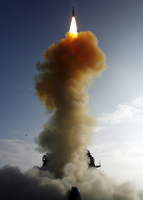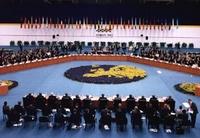
According to a recent article in Global Security Newswire, President Barack Obama might seek an international agreement to limit weapons in space, reversing Bush administration policy. As noted on the White House Web site, the new administration is calling for “a worldwide ban on weapons that interfere with military and commercial satellites.” The president’s position on this issue is impractical and dangerous. Proponents of the ban argue that because the U.S. has the most space-based assets to lose in a future space war, it also has the greatest interest in restricting the use of space to peaceful purposes. An international […]


